- You are here:
- Home »
- Blog »
- Exploring Your Internal Map Of Reality (Series) »
- Exploring Your Internal Map Of Reality Part 7: Metaprograms 6 (Putting It All Together)
Exploring Your Internal Map Of Reality Part 7: Metaprograms 6 (Putting It All Together)
 So far in our Internal Map Of Reality series we have spent several articles discussing Metaprograms, which are unconscious filters that determine what we are aware of from the external world.
So far in our Internal Map Of Reality series we have spent several articles discussing Metaprograms, which are unconscious filters that determine what we are aware of from the external world.
The first 4 metaprograms are:
- extrovert/introvert
- sensor/intuitor
- thinker/feeler
- judger/perceiver
These in combination with each other form the 16 ‘personality types’ according to Myers-Briggs.
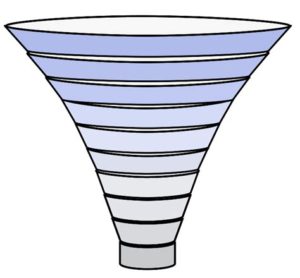 Then there are other filters such as
Then there are other filters such as
- Direction Filter (towards or away)
- Reason filter (possibility or necessity)
- Frame of Reference (internal or external)
- Convincer filter (representational or demonstrator)
- Action filter (active, reflective, both, inactive )
- Affiliation filter (things, systems, people)
- Work preference filter (things, systems, people)
- Primary Interest (people, place, things, activity, information.)
- Chunk size filter (specific, global, specific to global, global to specific)
- Relationship filter (sameness or difference)
- Emotional Stress response filter (feelings or decision)
- Time Storage filter (In Time, Through Time)
- Modal Operator Sequence (allied to reason and direction filter)
- Attention Direction (self or others)
- Information Processing Style (internal, external)
- Listening Style (literal, inferred)
- Speaking Style (literal, inferred)
As you can see from the list above, we are not simple beings!
Most of us are unconscious of these filters above, but if we could become aware of any of them operating at any time, we would have control over what we experience in life.
However, given that the conscious mind can handle only 5 (plus or minus 2) bits of information at any one time, it is best left to the unconscious mind to handle.
But let’s say you have a specific outcome in mind. The best practice is to focus on what you want. You can do this by meditating or by simply sitting down for a few minutes with your eyes closed and visualise it in your mind.
What happens next is your subconscious mind will set about making it happen for you. Now don’t be fooled – it is not ‘The Universe’ doing this, it’s little ol’ you!
You can use some of the metaprograms above to assist you in this process. To that end, here’s a brief discussion of the most important and appropriate metaprograms for this purpose.
THE MOST IMPORTANT METAPROGRAMS FOR A HEALTHY MENTAL LIFE
 Direction Filter
Direction Filter
We discussed this in part 2 of Metaprograms. When you focus on what you want, you are applying the ‘towards’ part of the filter. If you do the opposite, your mind will take you away from what you want because it does not understand negatives.
Also bear in mind that when ‘wanting something’ but being focused on the dangers is a learned behaviour that can be unlearned.
You can use a number of techniques to remove any focus on the ‘aways’ – NLP timeline Therapy is one such technique. By ‘dissociating’ out of the negative feeling you can capture the learnings, remove the emotional charge and move on.
Moving ‘away’ from something still has merit, however. For instance, when driving a car you need to be aware of all the things that could go wrong and have contingencies in place.
However, the trick is not to attach any negative emotions to these things, otherwise you’d be a nervous wreck. My mother used to be like this – she could never teach us kids how to drive!
Reason Filter
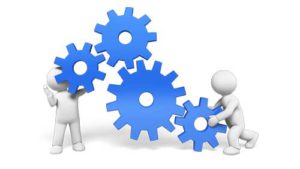 As we saw in part 2, in order to get what you want, you need to sort by possibility, not by necessity. If you do the latter, you will automatically filter out the possibilities, thus limiting or even sabotaging your efforts.
As we saw in part 2, in order to get what you want, you need to sort by possibility, not by necessity. If you do the latter, you will automatically filter out the possibilities, thus limiting or even sabotaging your efforts.
In reality there are infinite possibilities, and the problem is not that there are not enough possibilities, but that there are too many of them. Everyone who is successful in life sorts by possibility. Famous business people, inventors, scientists – you name them, they all were successful because of ‘possibility thinking.’
However many, if not most people think in terms of necessity. So-called ‘Poverty (necessity) Thinking’ has been brought about by times of scarcity and the assumption that all resources are scarce. Such economic and political philosophies as Marxism directly exploit this mentality. For them the pie is only so large and it must be divided up equally. Abundance (possibility) thinking says there is an abundance in the world and there is enough fall. if the pie is apparently too small, why not make it larger?
Frame of Reference filter

Is this guy inside or outside the house?
As discussed in Metaprograms Part 2, being aware of the outside world and of other people has its benefits. For instance if you need to learn something, it must come from something or someone outside of you. But being self aware and of your internal reality also has its merits. Making decisions is a process that, when done effectively, uses both internal and internal frames of reference.
Sensor / Intuitor
 If you recall from Metaprograms Part 1 as well as Part 4 of the entire series, having the ability to move up and down the hierarchy of ideas (a.k.a. Chunking) is a quality of intelligent and aware people. Being able to chunk up and down is function of the Reason Filter. By chunking up and down, you become more aware of the possibilities in any situation. You also reduce overwhelm because you are only dealing with small bits of information at any one time.
If you recall from Metaprograms Part 1 as well as Part 4 of the entire series, having the ability to move up and down the hierarchy of ideas (a.k.a. Chunking) is a quality of intelligent and aware people. Being able to chunk up and down is function of the Reason Filter. By chunking up and down, you become more aware of the possibilities in any situation. You also reduce overwhelm because you are only dealing with small bits of information at any one time.
A tip to get started on this is to ask yourself a few questions.
To chunk up:
- What is this an example of?
- For what purpose?
- What is the relationship between all of these things?
To chunk down:
- What specifically?
- What are the parts of this?
- What are examples of this?
Practice these regularly in a variety of situations and you will improve your ability to make the best and most appropriate decisions.
Thinker/Feeler
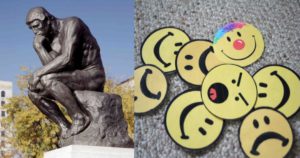 This was discussed in Metaprograms Part 1. The importance of this metaprogram is to be able to use either side of the equation in the most effective manner. There are some times when being a ‘Thinker’ is more appropriate that being a ‘Feeler’, and vice versa.
This was discussed in Metaprograms Part 1. The importance of this metaprogram is to be able to use either side of the equation in the most effective manner. There are some times when being a ‘Thinker’ is more appropriate that being a ‘Feeler’, and vice versa.
Clearly if you are stuck on either side you will have problems when the other side is needed. For instance, if you totally depend on your feelings for buying a car, without thinking about the price, maintenance costs, etc.
Being able to move appropriately from one side to the other is a key to living your life effectively.
Judger/Perceiver
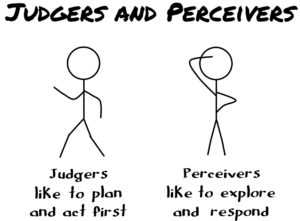 This was also discussed in Metaprograms Part 1. If you recall, ‘Judgers’ are results oriented and future centred. They need closure and they plan ahead. Again, this behaviour has it’s appropriate time and place and may not be appropriate in certain situations.
This was also discussed in Metaprograms Part 1. If you recall, ‘Judgers’ are results oriented and future centred. They need closure and they plan ahead. Again, this behaviour has it’s appropriate time and place and may not be appropriate in certain situations.
Conversely being a perceiver may be appropriate when you want to relax and just enjoy the moment. If you find yourself watching the clock when on vacation, your experience is sullied. On the other hand, if you need to be in a certain place at a certain time, being a perceiver will not serve you well.
Being a good ‘judge’ (so to speak) of the time to use each side of the equation will serve you well.
Convincer
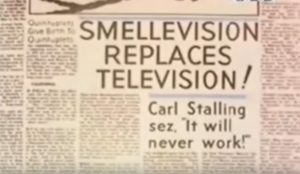 This metaprogram is also very important for your quality of life. Becoming aware of how you become convinced makes it a choice, and with choice comes empowerment.
This metaprogram is also very important for your quality of life. Becoming aware of how you become convinced makes it a choice, and with choice comes empowerment.
In Part 3 we highlighted 2 ways this works –
- the ‘representational system’ that is used (e.g. visual or kinaesthetic) and
- how many times you need to experience it to be convinced.
Becoming aware of these two things gives you a choice as to which one is used to the best effect. There may be times when seeing something is more appropriate than hearing it. It may also be more appropriate to combine your senses to be convinced. You might also want to see something more than once to be absolutely convinced.
Sameness or Difference
 The last of the most important metaprograms is the same/difference filter. Whilst each side of this filter has its merits – for instance being able to tell if something is hot or cold – is very useful when your goal is to not get burned. Knowing the difference between a tiger and a domestic cat can also be quite useful!
The last of the most important metaprograms is the same/difference filter. Whilst each side of this filter has its merits – for instance being able to tell if something is hot or cold – is very useful when your goal is to not get burned. Knowing the difference between a tiger and a domestic cat can also be quite useful!
 On the other hand, there are situations where sameness is useful: for instance when you see a 60 kph sign on the road you know it is most likely that traffic will move at that speed (presuming there are no roadblocks) and you can generally predict how long you will take to get from A to B.
On the other hand, there are situations where sameness is useful: for instance when you see a 60 kph sign on the road you know it is most likely that traffic will move at that speed (presuming there are no roadblocks) and you can generally predict how long you will take to get from A to B.
Being able to discern both sameness and difference as appropriate will enhance your life and empower it for you.
Conclusion
We have discussed all the metaprograms above and in previous parts of this long article (6 parts in all!).
The importance of metaprograms is that they filter your world in three ways:
- delete
- distort
- generalise
Becoming aware of how you do this is the first step towards empowerment and being at cause in your life. Knowing what the filters are, what they do and how they work is very useful, but the next step is to observe yourself doing them. This can be accomplished by meditation and mindfulness practices.
If you would like to know how to meditate easily and achieve the results of expert meditators 8 times as fast, please visit the Centerpointe web site for a free demo of their ‘Holosync®’ meditation program.
